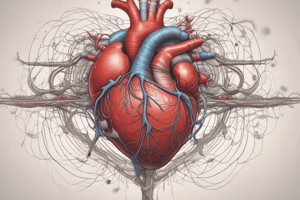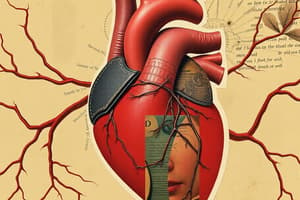Podcast
Questions and Answers
What is the primary function of the cardiovascular system?
What is the primary function of the cardiovascular system?
- Creating new blood vessels
- Generating waste products
- Producing oxygen
- Maintaining a steady flow of blood to all tissues (correct)
Which chamber of the heart receives deoxygenated blood from the body?
Which chamber of the heart receives deoxygenated blood from the body?
- Right ventricle
- Left ventricle
- Right atrium (correct)
- Left atrium
What is the main responsibility of blood circulation in the body?
What is the main responsibility of blood circulation in the body?
- Eliminating waste products
- Producing oxygen
- Transporting blood throughout the body (correct)
- Digesting food
Which component is NOT part of the cardiovascular system?
Which component is NOT part of the cardiovascular system?
In the heart, what is the function of the ventricles?
In the heart, what is the function of the ventricles?
What role do capillaries play in the cardiovascular system?
What role do capillaries play in the cardiovascular system?
What is the primary function of the heart?
What is the primary function of the heart?
What condition is characterized by the narrowing or blocking of blood vessels supplying blood to the heart muscles?
What condition is characterized by the narrowing or blocking of blood vessels supplying blood to the heart muscles?
Which type of blood vessel carries deoxygenated blood back to the heart?
Which type of blood vessel carries deoxygenated blood back to the heart?
Which part of the heart initiates the electrical signals responsible for muscle contraction?
Which part of the heart initiates the electrical signals responsible for muscle contraction?
What is the function of capillaries in the circulatory system?
What is the function of capillaries in the circulatory system?
In what condition is the heart unable to pump blood effectively?
In what condition is the heart unable to pump blood effectively?
Study Notes
Circulation: An Overview of the Cardiovascular System, Blood Circulation, Blood Vessels, Heart Function, and Circulatory Diseases
The cardiovascular system plays a critical role in maintaining the health and well-being of the human body. This system is responsible for circulating blood throughout the body, delivering oxygen and nutrients to cells and removing waste products. In this article, we will discuss the various aspects of circulation, focusing on the cardiovascular system, blood circulation, blood vessels, heart function, and circulatory diseases.
Cardiovascular System
The cardiovascular system, also known as the circulatory system, is responsible for the transportation of blood, oxygen, nutrients, and waste products throughout the body. It consists of the heart, blood vessels (arteries, veins, and capillaries), and blood. The primary function of the cardiovascular system is to maintain a steady flow of blood to all tissues in the body, ensuring proper nutrient delivery and waste removal.
Blood Circulation
Blood circulation is the process by which blood is pumped through the cardiovascular system. The heart, a muscular organ located in the chest, is responsible for pumping blood throughout the body. The heart has four chambers: the left and right atria and the left and right ventricles. Deoxygenated blood from the body returns to the right atrium, then passes through the tricuspid valve into the right ventricle. The right ventricle contracts, pushing blood through the pulmonary valve and into the lungs, where it picks up oxygen.
The oxygen-rich blood then returns to the heart, entering the left atrium through the bicuspid (mitral) valve. The left atrium contracts, pushing blood into the left ventricle. The left ventricle contracts, pushing blood through the aortic valve and into the aorta, the largest artery in the body. Blood is then distributed to the rest of the body through a network of arteries, capillaries, and veins.
Blood Vessels
Blood vessels are the conduits that carry blood throughout the body. They are divided into three main types: arteries, capillaries, and veins.
- Arteries: These are the thickest and strongest of the three types of blood vessels. They carry oxygen-rich blood away from the heart to the body's tissues.
- Capillaries: These are the smallest blood vessels. They are thin-walled and have a large surface area, allowing for the exchange of gases, nutrients, and waste products between the blood and the body's tissues.
- Veins: These are the largest blood vessels and carry deoxygenated blood back to the heart.
Heart Function
The heart's primary function is to pump blood throughout the body. It accomplishes this through a series of electrical signals that cause the heart muscle to contract and relax. The electrical signals originate in the sinoatrial (SA) node, a small cluster of specialized cells located in the right atrium. These signals travel through the atrioventricular (AV) node and down the specialized conduction system of the heart, causing the heart muscle to contract in a coordinated manner.
Circulatory Diseases
Circulatory diseases are a group of conditions that affect the cardiovascular system, including the heart, blood vessels, and blood. Some common circulatory diseases include:
- Coronary artery disease: A condition in which the blood vessels supplying blood to the heart muscles become narrowed or blocked, leading to chest pain or heart attack.
- Hypertension (high blood pressure): A condition in which the force of blood against the walls of the blood vessels is consistently too high, potentially damaging the heart and other organs.
- Heart failure: A situation in which the heart is unable to pump blood effectively, leading to fatigue, shortness of breath, and other symptoms.
- Venous thrombosis: The formation of blood clots within the veins, potentially leading to deep vein thrombosis and pulmonary embolism.
In conclusion, the cardiovascular system, blood circulation, blood vessels, heart function, and circulatory diseases are all interconnected and play vital roles in maintaining the health and well-being of the human body. Understanding these aspects of circulation is essential for promoting cardiovascular health and preventing circulatory diseases.
Studying That Suits You
Use AI to generate personalized quizzes and flashcards to suit your learning preferences.
Description
Test your knowledge about the cardiovascular system, blood circulation, blood vessels, heart function, and circulatory diseases with this quiz. Explore the intricacies of how blood is pumped throughout the body, the functions of different types of blood vessels, the electrical signals that regulate heart function, and common circulatory diseases.




